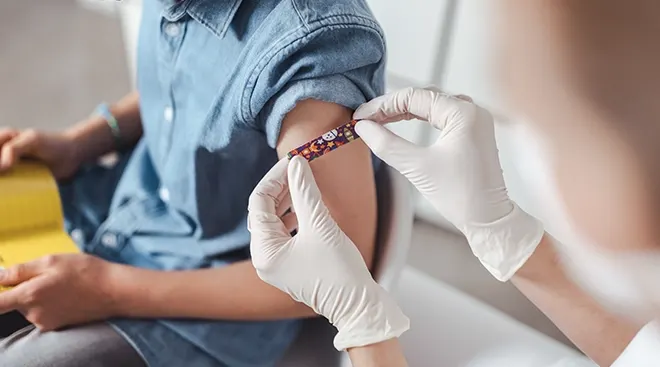Common Childhood Vaccines May Help Lessen the Severity of COVID-19
Experts are still trying to unpack the full effect of COVID-19. Now, a paper published in mBio is suggesting that people who get routine vaccines may be better protected against the novel coronavirus.
The paper, published in by Paul Fidel, Jr., PhD, associate dean for research at LSU Health New Orleans School of Dentistry, and Mairi Noverr, PhD, professor of microbiology & immunology at Tulane University School of Medicine in New Orleans, says that live vaccines, such as the MMR (measles, mumps and rubella), may help prevent the severe lung inflammation and sepsis that has been associated with COVID-19.
The authors say that these live vaccines can activate immune cells and train white blood cells, which protect the body against disease, to have a more effective defense against infections. They clarify, however, that they do not suggest these routine vaccines should be used directly against COVID-19, but rather simply as a way to strengthen the immune system against the inflammation caused by COVID-19.
“The use of childhood live attenuated vaccines such as MMR given to adults to induce bystander cells that can dampen or reduce severe complications associated with COVID-19 infection is a low risk-high reward preventive measure during a critical period of the pandemic,” Dr. Fidel stated in a press release.
He continues to explain that any adult who recieved the MMR vaccine as a child, while they will still have the antibodies against measles, mumps, or rubella, will not likely still have the immune cells directed against sepsis. Giving the MMR vaccine to adults may help them be better protected against COVID-related sepsis.
"If we’re correct, an MMR-vaccinated person may suffer less if infected with COVID-19. If we’re wrong, the person has better immunity to measles, mumps, and rubella. A sort of no harm no foul action,” Fidel continued.
While similar concepts are being tested in other countries, It’s important to note that this claim still needs evidence to support it. A recent review from the researchers at the Long School of Medicine at The University of Texas Health Science Center, shows that the majority of kids with COVID-19 in 26 countries fared better than adults.
The review, published in EClinicalMedicine, a journal of The Lancet looked at studies published between January 24 and May 14 of this year. It found that 19 percent of the pediatric population with COVID-19 had no symptoms; 21 percent had patchy lesions on lung x-rays; 5.6 percent suffered from co-infections, such as the flu, along with COVID-19; and 3.3 percent were admitted to intensive care units. The review also found that, in total, there were seven deaths reported.
“Our data is compiled from 131 studies and encompasses 7,780 patients who span the pediatric age spectrum,” study senior author Alvaro Moreira, MD, MSc, assistant professor of pediatrics at UT Health San Antonio and a fellowship-trained neonatologist, stated in a press release.
In the study, they looked at the most common symptoms, lab findings and imaging characteristics of kids with COVID-19. The researchers also looked at the treatments given and a few select cases that met the CDC’s criteria for a multisystem inflammatory syndrome diagnosis.
When looking at symptoms, kids’ most frequent symptoms, similar to adults, were fever and cough, found in 59 percent and 56 percent, respectively. In 223 individuals, there was a previous medical history, of which 152 were kids with compromised immune systems or underlying respiratory or cardiac disease. Plus, only a small number of patients were found to have symptoms consistent with multisystem inflammatory syndrome.
"Children with systemic inflammation had a significant decrease in the amount of lymphocytes (white blood cells) in their blood. COVID-positive children who didn’t have the extreme form of the disease had 42 percent lymphocytes in their blood, versus 11 percent in children with the multisystem syndrome,” Dr. Moreira noted. "Although we are hearing about severe forms of the disease in children, this is occurring in very rare circumstances.”
It’s important to note the study did not consider the new surge of young patients in New York, England and Italy with multisystem inflammatory syndrome, he added. While many of the studies reviewed did come from China, the largest study, which looked at 2,572 patients, was reported by the U.S. CDC COVID-19 team.
Both these studies claim that certain aspects in children, due to routine vaccines, or otherwise may help children fare better with COVID-19, which is great news. However, it’s important to keep in mind that much more research is needed before any conclusive statements can be made.
Please note: The Bump and the materials and information it contains are not intended to, and do not constitute, medical or other health advice or diagnosis and should not be used as such. You should always consult with a qualified physician or health professional about your specific circumstances.
Navigate forward to interact with the calendar and select a date. Press the question mark key to get the keyboard shortcuts for changing dates.





















































